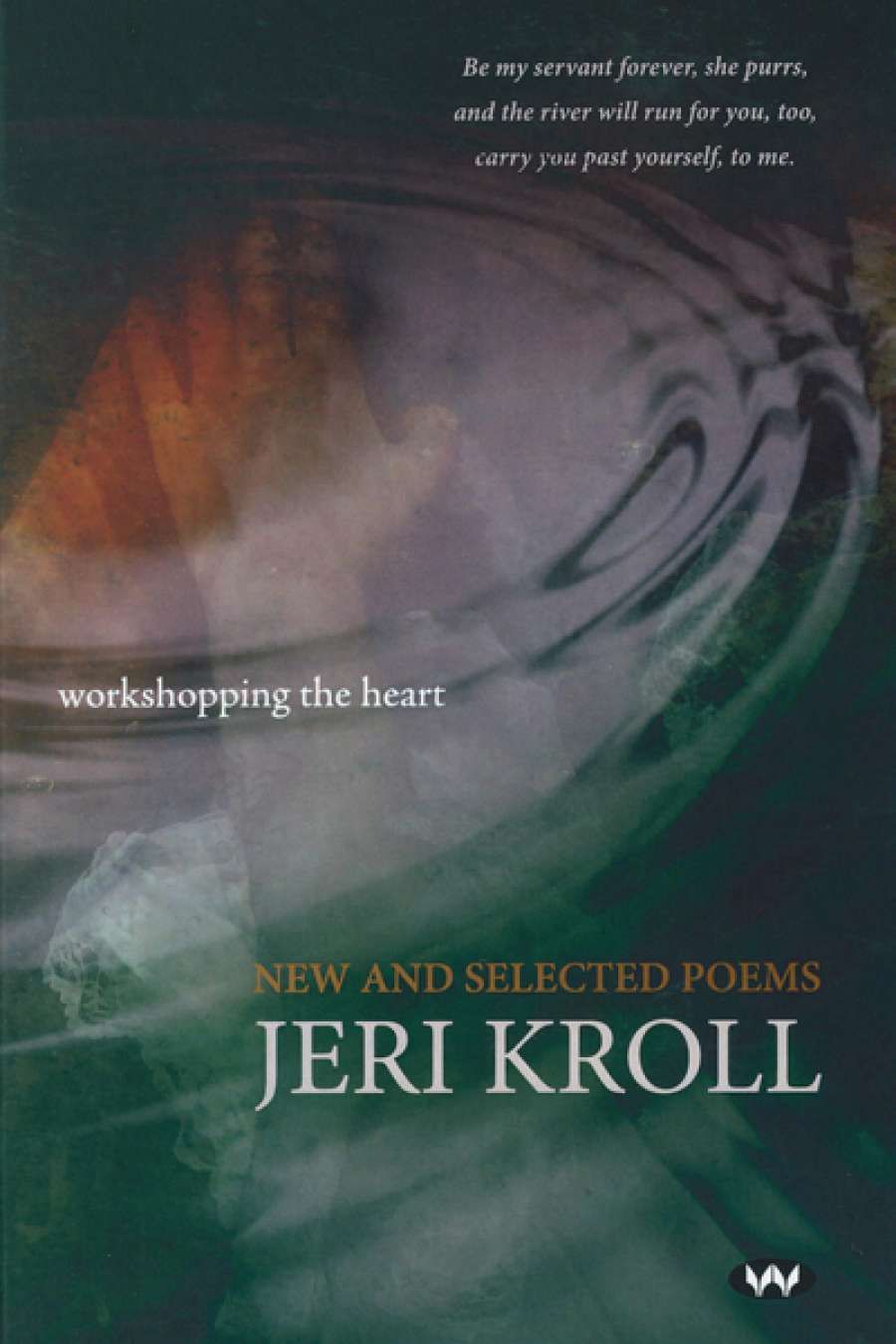
- Free Article: No
- Contents Category: Poetry
- Review Article: Yes
- Article Title: Shrapnel
- Online Only: No
- Custom Highlight Text:
In Workshopping the Heart, Jeri Kroll brings us a feast of poetry: selections from her seven previous collections, poems from 2005 to 2012, and excerpts from her forthcoming verse novel, Vanishing Point. From 1982 to the present we are able to witness an evolution towards a mature poetic voice as Kroll negotiates her way through life’s various traverses and the poetic explorations that both describe and reflect upon them.
- Book 1 Title: Workshopping the Heart
- Book 1 Subtitle: New and selected poems
- Book 1 Biblio: Wakefield Press, $24.95 pb, 216 pp
Kroll’s probing and incisive voice ranges across a number of scenes, from her native America to life in Australia, from experiences of love, intimacy and parenting, and observations on the domestic, to creative and empathic digressions into the specificity of other lives. This astute observer’s poems look out into a world of otherness, as well as inward. In the poem ‘Trip to the Amish’, for example, her camera, as a metaphor for the poetic eye, captures the strange figure of the ‘Bearded, resolute tiger of the Lord’, while a poem such as ‘Long-Distance Affair’ chronicles the intimate ambivalence of taking the chance of following love to Australia: ‘I cannot do otherwise, / dazed in the bush on a road by your headlight /… half of me lost down under.’ Kroll’s poetic voice is probing and direct, simple in its language, and profoundly interested in illuminating the experience of the individual.
In the poems from the collection Monster Love (1990), Kroll explores the simultaneously exquisite and torturous aspects of parenting – from the ecstasies of ‘joy’, to the ‘litany of the lunatic mother’, crazed with a heady brew of lack of sleep, passionate love and exasperation which leads to the complex emotional recognition of ‘I hate you, I love you, I hate you, I love you. / That’s clear unambiguous truth.’ The intensity of this relationship between mother and child, with all its shrapnel of consequence scattered across the rest of life and every other relationship is portrayed with touching insight; when we see the poet enter the empty room of her now-grown child to ‘Steal in, stand by the bed, / listening to no one breathe’, we understand the fundamental importance of this interaction in the densely textured fabric of a life.
The poems from The Mother Workshops (2010) pay homage to the poet’s mother; they trace her decline from Alzheimer’s disease and her ever-diminishing quality of life in a nursing home. Kroll’s touch is both direct and light here, loving in her evocation of her mother and in her detailing of this long and painful path to the end of life: ‘My mother is floating out to sea / without buoy or boat. She smiles as she drifts.’ Visiting, soothing, observing, searching for ways to connect, the speaker of these poems finds ways of describing the equal profundity and ordinariness of this slip – the slip in her mother’s well-being and in her own relationship with her. This mother, a woman who was once a dancer and singer, now staggers with other lost souls in the ‘Wandering Garden’, while ‘her body finally learns another tune / as fragile and as slow as healing bones – / composed for her alone but incomplete’.
 Jeri Kroll
Jeri Kroll
In the recent poem ‘Touching the Air (after a mastectomy)’, Kroll explores the experience of a body scarred by illness and its accompanying fears, peeling back guilt and anxiety to examine the disturbing reality of ‘what’s still there’: ‘Touching the air, / touching what isn’t there, / your superstitious finger tries its luck / at rousing what’s gone numb and flat.’ Not only the exploration of a highly personal moment, the poem can function as a metaphor for Kroll’s general poetic motivation: with searching impulse, to find what is hidden, the ‘bare-bulb truth’ that is often so hard to address – to know it, articulate it, come to some kind of terms with it – and to thereby find some sort of integrated path forward: ‘Let the air wash over what’s still there. / To shiver means at least to be alive.’ The voice here slips into invocation and almost ritualistic acceptance of what the world can bring, finally embracing the prospect of life despite its ravages and its limitations.
The final poems come from Vanishing Point. Already having had a staged reading at the Kennedy Centre in Washington, DC, this sequence of poems dramatises the life of a young girl struggling with issues of self-image, who decides to address her sense of awkwardness in the world by literally reducing her body to ‘Absolute Zero’. Afraid and fragile, Diana seeks a perverse agency by enacting and externalising the dissolution she is experiencing, thereby hoping to somehow become the author of her own fate. She tells her counsellor she has ‘begun a fantasy – / creative writing. But that’s not the truth. / This is a story / written on my body: / my words made flesh.’ Building Diana’s character through a string of short poems, Kroll experiments at the nexus of lyric and narrative, cumulatively taking a story forward while also offering the reader associative insight into the complex emotional life of this sad young woman.
Workshopping the Heart develops out of emotional material such as this, from what lies close to a personal core and also to the visceral pulse of a human body. Seeing and understanding ‘what is still there’, despite loss, despite damage, despite knowledge that the heart will one day stop, this is the vital stuff of poetry: what makes the imperfect experience of life so worth noticing and valuing.


Comments powered by CComment